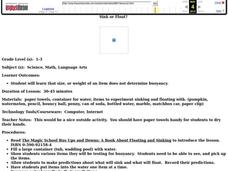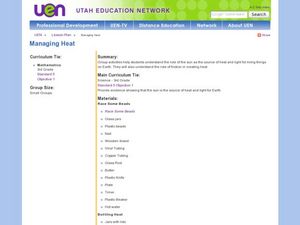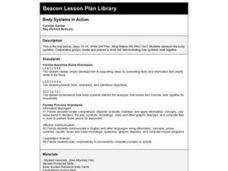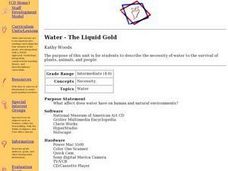Curated OER
Changing How Things Look
Third graders use a literature study in order to investigate how organisms effect an ecosystem. They are asked questions about change taken from the book. Students also take a nature walk to make field observations.
Curated OER
What's Down There
Third graders gather and examine samples from the school outdoor environment. They compare/contrast their samples with those of other students. Students record the results of their observations.
Curated OER
Water World Story
Fourth graders write a story about how a drop of water may have traveled to school. They design a presentation on the water cycle.
Curated OER
Decomposition
Learners are introduced to the concept of decomposition. They examine decomposition in their school orchard. They write about their findings in a journal.
Curated OER
Hottest, Coldest, Highest, Deepest: Science, 4th Grade
Fourth graders investigate weather patterns in their home state of Utah. After creating KWL charts, they research weather and geographical data to locate the state's extremes. As an extension, 4th graders write and illustrate books about...
Curated OER
To Rot or Not!
Students discover that composting helps reduce landfill waste and is good for the soil. They explore the techniques of composting through a variety of media, art activities and hands-on experience.
Curated OER
Hos Do the Jaguar and Howler Monkeys in Belize Depend on Us?
First graders access the internet and use the sites provided to research Belize, and in particular, the Howler Monkey and Jaguar. Students participate in activities/centers utilizing the information they discovered.
Curated OER
Sink or Float?
Students predict and test different items to see if they sink or float. In this sink and float lesson plan, students predict whether an item is buoyant or not, and learn that size and weight do not matter when it comes to buoyancy.
Curated OER
HOW BODY SYSTEMS INTERACT
Students study that the human body is made up of different systems whose functions are related. They draw and label their traced body outlines which include at least five body systems.
Curated OER
Water Treatment Plant
Second graders create their own water treatment system. In this water treatment lesson, 2nd graders create the water treatment system and record how it works. Students list materials they used and write about what they saw. Students then...
Curated OER
Creative Writing Using the Senses
Fifth graders, utilizing a thesaurus to identify alternative word choices and meanings, eat a sweet treat and then list eight different adjectives for each of the five senses. They then describe a sweet with at least then adjectives...
Curated OER
Would You Like A Desert With That?
Young scholars explore the four different deserts in the United States and their characteristics. They discuss the four different types of deserts in United States and their characteristics, and locate them on a map.
Curated OER
The Wonderful world of Water
First graders examine the water cycle through readings and experiments. In groups, they conduct interviews with others and use the information to create a chart displaying the various uses of water. After brainstorming lists of ways to...
Curated OER
Spider Body Parts
Students identify spider body parts. In this arachnid lesson, students review the story Amazing World of Spiders and discuss the various spider body parts. Students fill in the correct body parts on a copy of a blank spider diagram....
Curated OER
An Emerald Place
Students discover four layers of the rain forest and identify the life of animals at each level.
Curated OER
WEAVING TECHNOLOGY INTO THEMATIC UNITS T.O.O.L.S. 2000
Third graders utilize computers and other technology to explain the solar system. Ten different stations involve students through laserdisc, research, art, GeoSafari, space toys, and the computer.
Curated OER
Managing Heat
Third graders perform various experiments to show the flow of energy that causes heat. In this heat lesson, 3rd graders understand how heat is transferred or trapped. Students use the scientific method and critical thinking skills to...
Curated OER
Water Cycle
First graders research for information on the water cycle. They use a hot list to find pictures of the water cycle, and create a movie in Kid Pix about the water cycle.
They present Kid Pix movie to the class.
Curated OER
Body Systems in Action
Fifth graders, in groups, create a short skit that shows how body systems work together.
Curated OER
Water-The Liquid Gold
Students investigate the necessity of water for the survival of plants, animals, and people. They explore the affect that water has on human and natural environments through literature, field trips, and discussions.
Curated OER
Making a Sundial
Third graders make a sundial and explain how to use it. They describe the movement of Earth and the moon and the apparent movement of other bodies through the sky. They predict what happens when they put their sundials in the sun.
Curated OER
The Water Cycle
Fourth graders explore changes in water forms. In this water cycle lesson, 4th graders build a water cycle model and monitor it for 2 weeks in order to understand that water changes state as it moves through the cycle.
Curated OER
What's in the Water?
Learners examine how pollutants can affect ocean animals. In this pollution lesson, students read a story about the ocean floor, think about what would happen to the plants and animals if the ocean became dirty or polluted, and conduct...
Curated OER
Whose Water Is It?
Students role-play as San Francisco residents in 1908 who support or oppose the building of a dam in Yosemite National Park. They create posters and write letters to representatives defending their positions.

























